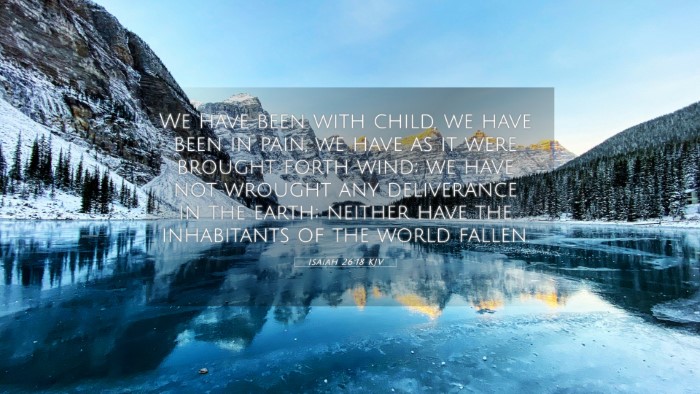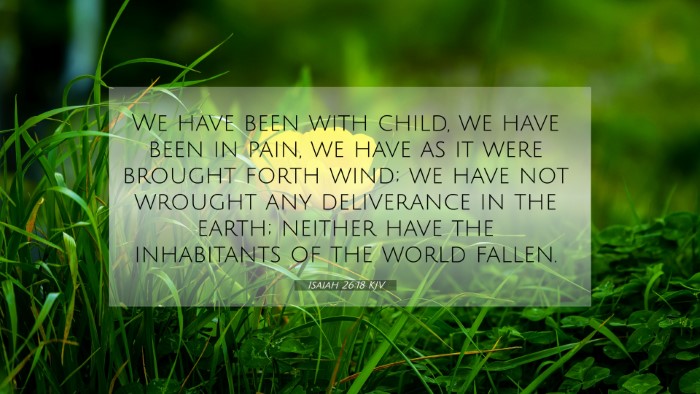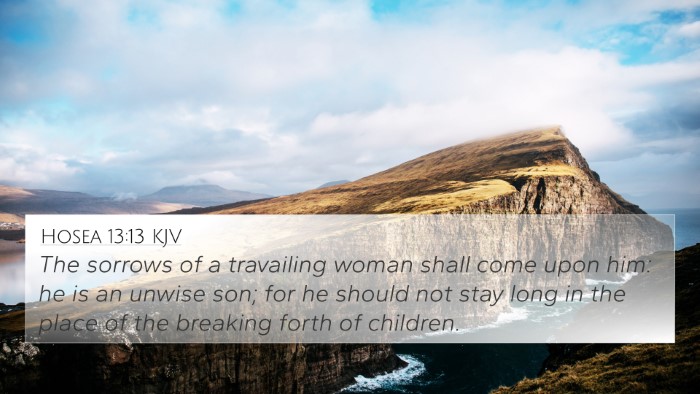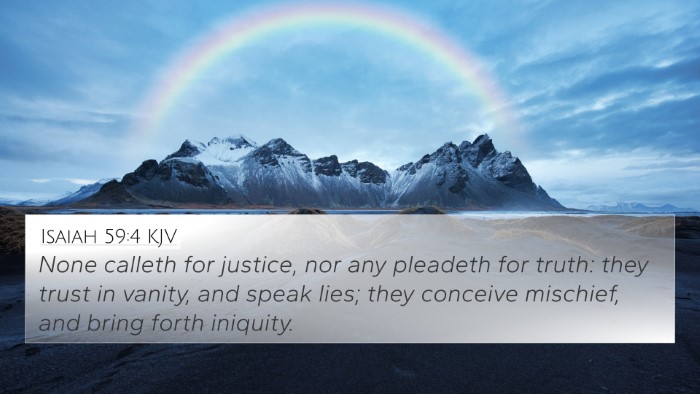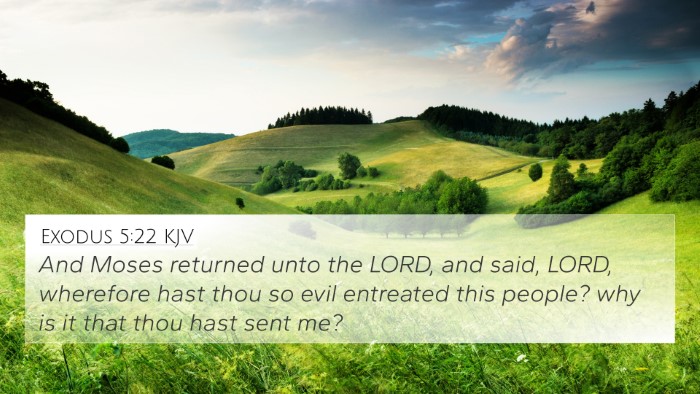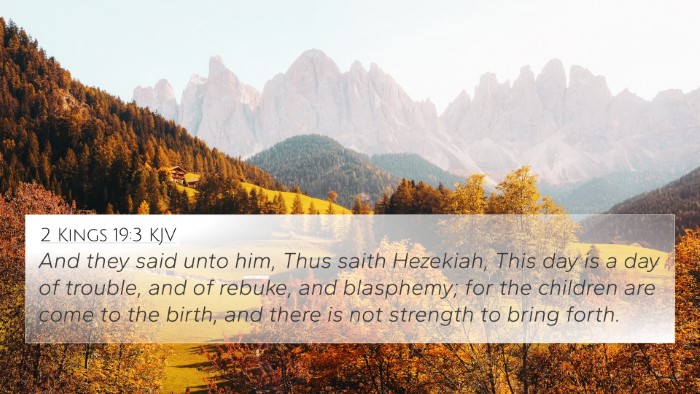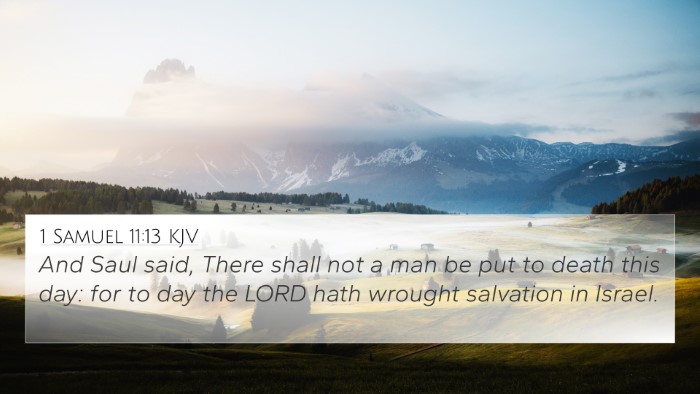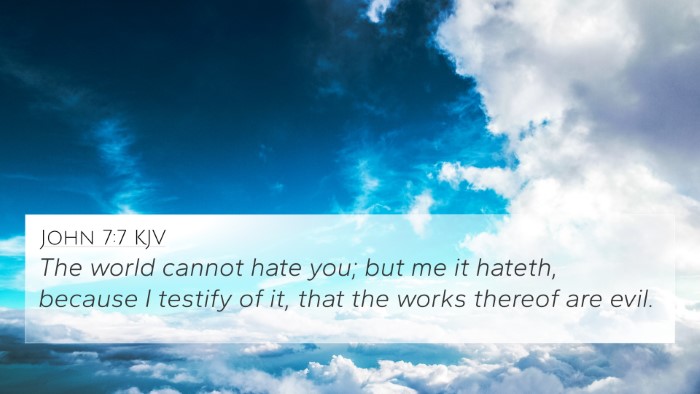Understanding Isaiah 26:18
Isaiah 26:18 states, "We have been with child, we have been in pain, we have as it were brought forth wind; we have not wrought any deliverance in the earth; neither have the inhabitants of the world fallen." This verse reflects deep emotional strain and a sense of failure in spiritual labor. To comprehend this verse thoroughly, we can draw insights from various public domain commentaries, highlighting its meaning and connections with other Bible verses.
Meaning and Context
This verse appears in a context where the people of Israel are lamenting their inability to bring forth true spiritual fruits despite their efforts. Matthew Henry points out that the verse uses the metaphor of childbirth to illustrate the painful yet fruitless efforts of the exiles who hoped for salvation and deliverance. They feel as if their travail has produced nothing but ‘wind,’ signifying emptiness and disappointment.
Key Insights from Commentaries
-
Matthew Henry: He emphasizes the sorrow of the people, noting that they have undertaken the labor of faith and righteousness, yet they feel as though they have achieved nothing of substance. This pain reflects the broader struggles of the human condition, emphasizing the need for divine intervention for true deliverance.
-
Albert Barnes: Barnes highlights the futility expressed in this verse. He suggests it indicates the inaction of the people despite their hopes that God’s promises would yield results. The ‘bringing forth’ conveys the anticipation of a new age or blessing that remains unfulfilled.
-
Adam Clarke: Clarke offers a focus on the symbolism of ‘wind’ as a metaphor for vapor or something insubstantial. He stresses the depth of despair that can come from unfulfilled expectations in one’s spiritual journey, leading to a recognition of the need for God’s power to enact change.
Thematic Connections
The themes present in Isaiah 26:18 can be cross-referenced with several other Bible verses that explore similar feelings of despair, hope, and the human experience of waiting for God’s deliverance.
Bible Verse Cross-References
- Romans 8:22-23 - "For we know that the whole creation groaneth and travaileth in pain together until now." This reflects a similar sentiment of longing and struggle in futility.
- Job 14:1-2 - "Man that is born of a woman is of few days, and full of trouble..." Job’s lament parallels the feelings of anguish expressed in Isaiah.
- Psalms 126:5 - "They that sow in tears shall reap in joy." This verse offers a contrast that articulates hope amidst despair.
- Galatians 6:7-9 - "For whatsoever a man soweth, that shall he also reap..." This reminds believers that spiritual labor, although painful, ultimately leads to fruition when cultivated with patience.
- Isaiah 53:4-5 - "Surely he hath borne our griefs..." revealing the suffering servant who empathizes with humanity's pain, tying into the collective sorrow in Isaiah 26.
- Lamentations 3:32-33 - "But though he cause grief, yet will he have compassion..." This shares the profound relationship between suffering and God’s ultimate compassion.
- Matthew 11:28-30 - "Come unto me, all ye that labour and are heavy laden..." Here, Christ invites those in pain to find rest and hope.
Conclusion
In summary, Isaiah 26:18 serves as a poignant reminder of the struggles faced by believers when their efforts seem unfruitful. The cross-references provided highlight a broader biblical narrative that consistently engages with themes of suffering, hope, and divine redemption. By studying these connections, readers can find comfort in knowing they are not alone in their struggles and that there is a divine promise of deliverance that transcends immediate discomfort.
Tools for Understanding
To better navigate and understand the connections between these verses, utilizing a Bible concordance or a cross-reference Bible study guide can be extremely beneficial. These tools allow for the identification of themes and patterns throughout the scripture, enhancing one's understanding of how verses relate to one another, especially in the context of comprehensive Bible study.

